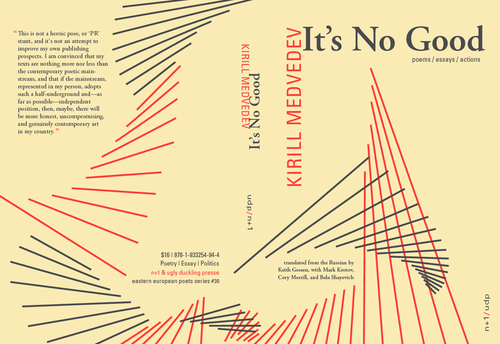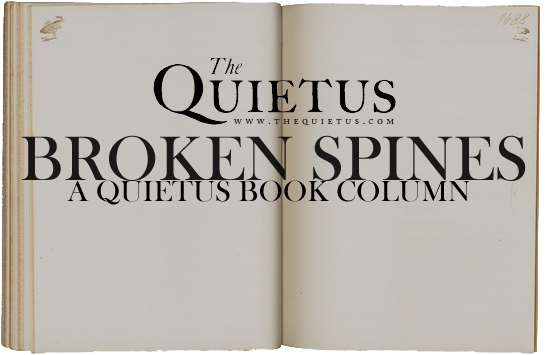Write a book column they said. It’ll be easy they said. In fact, it was my first order of business when I took up editing the glittering literary trinkets that now adorn the Adonis-like frame of The Quietus back in August: a monthly look at the cream, and of course the rank, lumpy jizz-yoghurt, of the literary crop. One article every four weeks – piece of piss, right? Given that you’re now reading the first instalment, some seven months later, and that I’ve had to enlist some very capable help even now, I think it’s fair to say that – at least in that particular sense – piss it is not.
Perhaps the most lamentable part of Broken Spines’ elephant-like gestation period is the sheer volume of books that have passed their sell by (or at the very least "display until") date over the last seven months. With that in mind, in memoriam, please cast a brief and respectful eye over our first Recycle Bin of Recommended Reading: Shall We Gather at the River by Peter Murphy, Bolaño’s Woes of the True Policeman, the Selected Stories of Robert Walser, The Teleportation Accident by Ned Beauman, Mark Z. Danielewski’s Fifty Year Sword, Back to Blood by Tom Wolfe, Sex Press by Vincent Bernisre and Mariel Primois, Bad Pharma by Ben Goldacre, Jon Ronson’s Lost at Sea, How Should a Person Be? by Shelia Heti, Scott Hutchins’s A Working Theory of Love and Narcopolis by Jeet Thayil. We will remember them.
-Karl Smith
Huw Nesbitt Selects
It’s No Good by Kirill Medvedev (Ugly Duckling Press/n+1)
Charles Baudelaire once remarked that the reason Edgar Allen Poe died such a brutal death in 1849 – ravaged by madness and possibly alcohol as well – was because America imposed itself upon him like a prison.
In the same way, you get the impression that Russia is like a penitentiary or worse, a madhouse for Kirill Medvedev, the 37-year-old Muscovite author of this collection of essays and poems in translation – poems that rattle the bars of his cell, stage rooftop riots and coordinate dirty protests.
Indeed, after the dissolution the USSR, the lunatics arguably took over the asylum in Russia, whereby the mafia began establishing control in the 1990s and assumed state positions in the 2000s. Meanwhile, crackpot movements started to appear, such as the National Bolsheviks (a nationalist Stalinist-anarchist group), the country became awash with fervent anti-liberalism, and disparate groups from the far left and the far right united, unsuccessfully, against Putin.

All of which sounds a little bit like Germany in the 1930s, and we all know how that ended. Nonetheless, this is the atmosphere that has cultivated Medvedev’s free verse, which on first reading can seem a bit jejune or just plain half-arsed. ‘I’m tired of translating,’ he writes in the opening poem, autobiographically referencing his job. ‘I probably won’t translate/anymore/I think it’s only worth doing/if you can become one with the author,’ he continues.
Sorry, but who gives a fuck about your personal life? I said out loud on my initial reading. Then I sat down and thought about it a little more, and actually, what he’s really saying is that by refusing to translate, by refusing to enter into a world of equivalence, he’s announcing an epistemological break with the status quo, insisting on the singular nature of truth as a radical fidelity, and rejecting the postmodern conception of literature as a contingent form. (The bit about becoming one with the author is probably something to do with Walter Benjamin too.)
In a simpler explanation of his conception of literature in an essay entitled, ‘My Fascism (a few truths)’, Medvedev goes as far as referring to literature as a ‘battle’ before reflecting on the life of the work of the Italian Marxist director and poet, Pier Paolo Passolini, and concluding: ‘He always understood art as an uncompromising critique of power.’ Which is certainly true of Medvedev as well, as these poems and essays, frequently directed at the stasis of thought and action in Russia, demonstrate.
And if all that wasn’t enough then there’s a good a couple of paragraphs dedicated to shit raking the New Sincerity movement for reviving essentialism of individual experience and implicitly flirting with fascism, which is something I could read on a daily basis.
Exodus by Lars Iyer (Melville House)
I haven’t read Spurious or Dogma in Lars Iyer’s trilogy, but there’s a temptation to read Exodus, a novel about the misfortunes of two middling leftwing philosophy professors engaged in a lecture tour of the UK discussing the philosophical links between Karl Marx and Sören Kierkegaard as a straightforward reflection on the age of austerity.
This temptation probably stems from the fact that the novel’s protagonists, W. and a character named Lars Iyer, spend half the novel drinking gin and lamenting the evisceration of every public institution from universities to park benches.

However, such a reading would ignore the joke about the parallels between Marx and Kierkegaard. On the one hand you’ve got the Marx of ‘philosophers have only interpreted the world […] the point is to change it,’ and on the other, dear old Sören in Fear and Trembling wetting himself about infinite resignation as the path to faith.
Indeed, one of the book’s chief concerns is the dominance of political theology in contemporary thought. While visiting Essex University – one of the bastions of leftwing thought during the 80s – for a conference by the French anti-postmodern philosopher, Alain Badiou, W. reflects:
‘What would Alain Badiou make of us? What would he conclude? Enemies, he would think. No, not even that, Badiou would think, – ‘Pas enemies. Les tosseurs’.
Before concluding:
‘For the mathematical philosopher, vagueness doesn’t exist, not really; it’s only a deficiency of precision. And for the political philosopher, pathos doesn’t exist’.
On the contrary, all that is left in Exodus is pathos, terminal decline and infinite resignation, not the sort of resignation that, like Kierkegaard leads to a spiritually enlightened state, but the resignation of the damned as they limp and whimper their way into an eternity of shit and hellfire.
‘It’s happening just as I predicted, W. Says. The collapse of the universities. The collapse of civilisation,’ remarks Iyer on W.’s thoughts. ‘You think this is bad? It’s going to get worse, much worse’.
All of which poses a serious question: is Iyer is a poet of nihilism? Is he the writer of modern solipsism? Only in the sense that at least what Exodus does is point to the fact that all of our contemporary failings, all of our economic and political disasters, are not just the fault of greedy bureaucrats and politicians, and not just the failings of thought, but of the denigration of thought itself and our subsequent inability to act upon it.
NB: although this probably not apparent from the above, Exodus is one of the funniest books you’ll read this year, and you don’t need to understand the difference between Theodor Adorno and Louis Althusser to get in on the gags.
Karl Smith Selects
Etc Etc Amen by Howard Male
To say ‘chance is a funny thing’ is to sell it comprehensively short. If anything, chance is, well, everything. It was by chance that I became Facebook “friends” with Howard Male, through some obscure link, an erroneous comment on some nugget of wisdom left by one of our three “mutual friends.” (If you’ve seen Steven Soderbergh’s Contagion, you might be reminded of the r0 – the number of other people that a single person is likely to infect with a particular disease.) It was, then, also by chance that I came to hold a copy of Male’s debut novel – the exceptionally titled Etc Etc Amen.
It is, of course, inevitable that the third portion of that title will be the one that attracts the most attention – both positive and negative sorts – particularly in cahoots with the novel’s prevailing narrative stream: its “anti-religion,” a notion so primed for misinterpretation one can’t help but feel it might be a touch contrived. (A thought not exactly assuaged by Male’s own conviction that its perceived "fuck you" to organised religion might have impacted its publication.) But it is a misinterpretation: the novel isn’t anti-religion in any real, vitriolic sense. In fact it has a similar warmth about it to Kevin Smith’s Dogma, preferring to build on that same notion of a good idea with the best intentions that passed through the intestines of some very unstable individuals and was shat out in to something unrecognisable.

What sets Etc Etc Amen apart from other religion-based novels (and boy are there others) isn’t so much that it constructs, in a vigorous and uncompromising level of detail, its own counter-religion but rather its particular brand of messiah: the musician. Yes, this chimes with an almost universal element of popular culture that now dates back for the best part of a century, from Elvis, through Dylan and Jagger, right up to Lady GaGa and Harry Styles – but Male’s is a double-edged sword that cuts beyond this kind of cliché. It is, rather, the author’s "real" job as a music journalist (and his previous as a musician himself) that provides a sort of meta-narrative quality raising his novel up above the throng: an analogous study on music writing whereby we are presented the journalist as apostle – as much a contributor to the religion as any messiah.
It’s true of his prose as it is of his fictional religion (KUUism) that Male does not eschew detail, and that this doesn’t always work in the novel’s favour – there is a clear penchant for over description (‘As if responding to a director’s cue, Zac got to his feet and crossed the room with the precise liquid movements of a predatory cat’ … ‘Valentine had picked the lookers like a football coach chooses his team’ are but two examples) that will get a firm hold of the goat of as many as it will captivate. But it is the detail – the Etc Etc – that makes Etc Etc Amen such an enthralling read; Male’s eye for the impact of the minute on the bigger picture is what sets him apart as a writer and as a promising literary talent.
Follow @theQuietusBooks on Twitter for more


